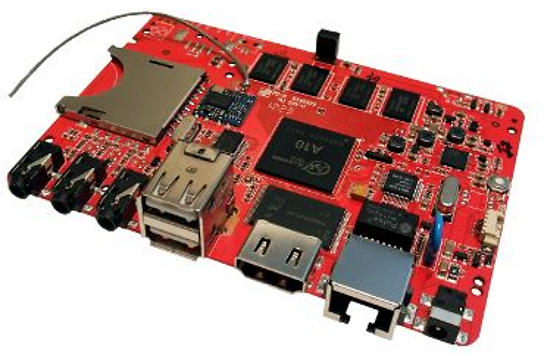A New, More Powerful Challenger to the Raspberry PI!
 Sure, it costs almost twice as much, but look what you get for your $60.00!
Sure, it costs almost twice as much, but look what you get for your $60.00!
Hackberry A10 developer board: $60 PC board with Allwinner A10 CPU
“A Hackberry A10 Developer Board with 512MB of RAM is available for $60. A 1GB model should be available soon for $65.
Both models include:
- 1.2 GHz Allwinner A10 ARM Cortex-A8 CPU
- Mali 400 graphics
- 4GB built-in storage (1.5GB available in the Android user partition)
- 802.11n WiFi
- 10/100 Ethernet
- 2 USB 2.0 ports
- SDHC card slot
- HDMI
- 3.5mm mic jack
- composite video output
- 4-pin serial header
Miniand is selling a new developer board called the Hackberry A10. It features an Allwinner A10 processor for about $60. It’s basically a little computer with a CPU, memory, and storage built in. It also has a range of input and output options.
What it doesn’t have is a case. You’ll want to buy or build your own if you plan to use the Hackberry A10 Developer Board as a desktop computer or set-top-box for your TV. You could also theoretically use this sort of box to power a robot, web server, or a range of other devices.
It’s a lot like a $35 Raspberry Pi, except the HackBerry A10 costs $60 and up, has more memory, built-in-storage, a faster processor, and WiFi.
The Allwinner A10 processor is a single core ARM Cortex-A8 chip with Mali 400 graphics. It’s not as fast as an NVIDIA Tegra 3 or Samsung Exynos 4412 chip, but it’s a lot cheaper, and it can still handle HD video and a range of basic tasks.
That’s one of the reasons it’s proven popular with budget Android tablet makers such as Coby. But the chip is also showing up in a growing number of mini PC devices that are designed to be used with a TV, mouse, keyboard, or remote control.
We’ve seen a range of these devices, including the MK802, Mini X, and Mele A1000. While most ship with Google Android, they’re also capable of running Ubuntu, Fedora, and other Linux-based operating systems.
Like those devices, the Hackberry A10 will ship with Android 4.0, but Miniand plans to offer Linux images for the device. These are the same folks who brought us some of the first Linux images for the MK802, so they have a pretty good track record with this sort of thing.”